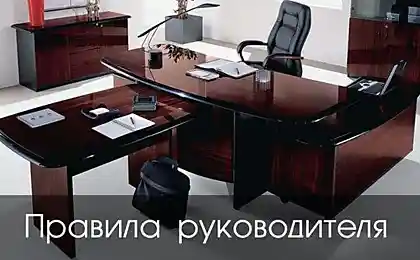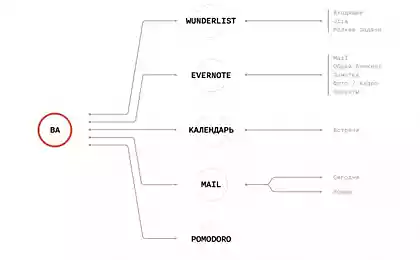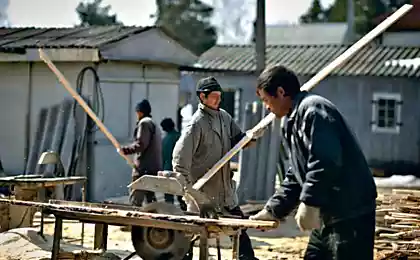719
How to avoid the kiss-off tasks from his subordinates
or How to avoid "refund monkeys" and "kiss-off task" from subordinates
"Time-eaters" of the head
Statistics relentless. The main “eater” of the working time Manager is the operational matters with a subordinate, which actually lie within their competencies and responsibilities.
The result:on execution of their direct responsibilities for the management and development divisions of time no longer remains.

This happens for the following main reasons:
The lack of regulations and instructions for common and repetitive tasks. Colleagues, it is high time to move from personalized management to management roles! In your company there is no clear formal resolution scheme arising from staff issues (because subordinates do not know what to do, then immediately run to “the highest” head, which only can reach). This is the trap of "the generator of responses." Chances are that your subordinates are hand stuffed in the “replanting of the apes” and “kiss-off tasks.”
On the second and third reason I will explain in detail in the article.
Rules review and resolution of questions and requests from subordinates
The questions may be different:
Before formulating rules and principles, I propose to understand the causes “congestion” of the head of these issues.
Where there are “eaters” time Manager:
The plan takes into account that the company, in addition to formal organizational structure, project management is used. The projects involved staff from different departments (temporary project team), which manages a “project Manager”.
Examples of projects: “to introduce new technology sales, go to the new version 1C: Enterprise”, “moving to a new office”, etc.
The scheme of solution of questions (the sequence on a higher level):
All the staff who are trying to circumvent the scheme, it is necessary immediately “to beat the hand”? What to do to force majeure, the question is not stuck in the framework of this scheme, and was immediately sent to a higher level where it can be quickly resolved?
For this to the schema you want to add explanations about the script of the actions of subordinates, depending on the urgency and importance of the task/question.

The principles address issues from subordinates
Different principles apply to both urgent and non-urgent issues. They have common elements.
Unreasonable “jumping” stages in the scheme the solution is equally predictable end for subordinates. General principles:
An example from my practice: “jump over the head and transplanting monkey”a New employee, John, who recently came to work for us, came to me with a question (which is clearly within the competence of its Manager) directly. On what received the answer: “contact your supervisor” and got a link to the rules.
The second time the question was followed after 1 week. My answer was the same. The third time Ivan approached me with a similar question in 3 weeks. What was my answer, what do you think? Yes, since 3 months have passed, and new issues that should be resolved by the head of Ivan to me did not arrive.
By the way, if Ivan can easily jump the head of its leader, it can push on the idea: much resistance from his immediate "boss" was not. This case will detail the following example (see below article).
The principles of independence and autonomy for employees when performing tasks and solving emerging situations
These principles will be useful for addressing the systematic “perezhivaniyami of the apes” (return in one form or another from the subordinate tasks) and “kiss-off tasks” (often accompanied by “I don't know, talk to...”).
First, offer to get acquainted with the reasons.
Where there are “eaters” of management time
Suppose, appeals to you subordinate to the “explicit promise” that you should do some case and/or to solve the problem (not, help him or provide resources, and to make for him!), which clearly is in the region of its proximal development (literally means that the employee can perform this task independently).
In this case it is you "throws a grenade" because of corporate policy should be this: the subordinate must perform the actions in the area of its proximal development. Rather than trying by hook or by crook "puzzle" of their leader.
Examples of such questions from my business (you of course will have their own):
He wants to answer comprehensively and in detail, isn't it? However, the response is "to return the gift back" in the form of a request in writing to answer the following questions:
Formulate your suggestions for solving this problem. You need to enable You to solve this problem yourself? Why You didn't come for a resource request, with the request to solve this problem for You?
9 times out of 10 immediately after such a request, the subordinate decides to take the task themselves (this, of course, does not negate the need to answer questions and support from the head in solving the problem where it is really needed).
About 10 percent of cases where do when solving a problem requires active participation of the head. To such cases apply the following rule: all written answers must be recorded in the electronic personal file of the employee concerned.
To get rid of honorable duty to perform tasks for subordinates — the rule is "to return the gifts back"Enough "to return the gift back" this way several times and subordinates will no longer come with the request to solve problems over which they haven't worked, but the execution of these tasks — in the area of the nearest development of employees.
But what if the employee “includes a fool”, “don't understand”? Detail with him to make out what behavior is expected and what kind of trouble can be expected (demotion, salary reduction, dismissal, in the end). And if after a few conversations positive dynamics was observed — be prepared with a subordinate to say goodbye.

An example from my practice: “jump over the head and transplanting monkey”
One of the staff, Svetlana, “jumped” the head of her immediate superior, the most common method. Asked about the challenge from the Client, which, of course, must answer to its Director, Anatoly.
Asked to refer to Anatolia with this question Svetlana wrote honestly: “And he said to come to you.” Svetlana was said: “All right, wait for feedback”.
At this point I got in touch with Anatoly, was dismantled in detail with him as he was supposed to do: to solve the problem yourself or suggestions/ideas and only after that turned to me for help. He made a rather classic attempt “to transplant my monkey”. This, of course, I'm not ashamed to say.
Results: in Anatolia there is no more desire to “football” tasks and “transplanted monkeys”. Svetlana understands that jump over the head is fraught with trial.
Conclusion: leave the stream of questions with three “B” as quickly as possible
Systematization and correct work with incoming questions from employees significantly reduces the time of stay of the head in endless, merciless and senseless (here it is, three “B”!) the stream of questions lying within the competence of his subordinates.
This will free up time for management and strategic development units, which we “never enough”!
But... good addition. Important point: the leader must assess what is happening in the division/company in all respects. Not only to see that the "tasks do not come", and assume that everything is fine. But to have an understanding of "why they don't come": decide whether they subordinate their own or simply "buried" away and not run. For those who are not able to measure continuously, the sudden flow of force majeure — the best evidence about the second option.published
Author: Eugene Sevastyanov
P. S. And remember, only by changing their consumption — together we change the world! ©
Join us in Facebook , Vkontakte, Odnoklassniki
Source: openstud.ru/blog/for-businessmen/managers-time/
"Time-eaters" of the head
Statistics relentless. The main “eater” of the working time Manager is the operational matters with a subordinate, which actually lie within their competencies and responsibilities.
The result:on execution of their direct responsibilities for the management and development divisions of time no longer remains.

This happens for the following main reasons:
The lack of regulations and instructions for common and repetitive tasks. Colleagues, it is high time to move from personalized management to management roles! In your company there is no clear formal resolution scheme arising from staff issues (because subordinates do not know what to do, then immediately run to “the highest” head, which only can reach). This is the trap of "the generator of responses." Chances are that your subordinates are hand stuffed in the “replanting of the apes” and “kiss-off tasks.”
On the second and third reason I will explain in detail in the article.
Rules review and resolution of questions and requests from subordinates
The questions may be different:
- the task
- projects
- force majeure,
- other emerging situations.
Before formulating rules and principles, I propose to understand the causes “congestion” of the head of these issues.
Where there are “eaters” time Manager:
- Answering the question or putting someone personally the task directly (without the involvement of the immediate supervisor), head forced to monitor its implementation, to respond to the additional questions for clarification, to accept the result and be responsible for it.
- Getting direct questions (from all subordinate units and personnel) Manager gains confidence that he “keeps his finger on the pulse” of what is happening in the company.
- Trap "generator answers": Head to respond to any questions, regardless of their urgency, importance and someone who is asking them. The flow of wanting to get answers will rise exponentially. Note: if the line Manager receives the questions only from their immediate subordinates, his superiors ... from all departments. Thus, the higher in the hierarchy is the head, the greater the flow of calls and requests.
The plan takes into account that the company, in addition to formal organizational structure, project management is used. The projects involved staff from different departments (temporary project team), which manages a “project Manager”.
Examples of projects: “to introduce new technology sales, go to the new version 1C: Enterprise”, “moving to a new office”, etc.
The scheme of solution of questions (the sequence on a higher level):
- Question by task → task Creator → project Manager → Director Director tasks → Executive Director → Director General.
- Question project → project Manager → Executive Director → Director General.
- Internal question (to guide) → Executive Director → Director General.
All the staff who are trying to circumvent the scheme, it is necessary immediately “to beat the hand”? What to do to force majeure, the question is not stuck in the framework of this scheme, and was immediately sent to a higher level where it can be quickly resolved?
For this to the schema you want to add explanations about the script of the actions of subordinates, depending on the urgency and importance of the task/question.

The principles address issues from subordinates
Different principles apply to both urgent and non-urgent issues. They have common elements.
Unreasonable “jumping” stages in the scheme the solution is equally predictable end for subordinates. General principles:
- Before asking a question, it is necessary to formulate comprehensive proposals for its decision in writing (GDocs file) with brief reasons why it is so. The lack of suggestions and/or their apparent “formality” is regarded as a lack of competence on this issue/issues, as well as possible, and management skills (for managers).
- Unreasonable “jumping” stage in the solution scheme of issues is qualified is regarded as insubordination.
- Rules are relevant for all links in the “scheme of the solution of questions”, i.e. if the project Manager does not know how to solve any issue received from the contractor on the project, the Executive Director must provide their proposals in the form of supplements to the offer of the contractor or commentaries.
- If the situation requires immediate action and can be classified as a threat to the reputation of the company or the Customer, the profits of the company or Client, etc., should be immediately to the Executive Director, or his Deputy (in your company, it may be the other person).
- Passing of sentences and the resolution (the view) to a new level, get them from the previous level is now solely responsible for their content.
- All questions that do NOT require immediate decisions (discussion may be postponed in time) should be collected in “one pack” to save (write), to provide up to the discussion leader and discuss successively in one session. The recommended time for “communication sessions” twice a week.
- In case the set of formal tasks in Bitrix24 non-urgent question within a comment to a task.
An example from my practice: “jump over the head and transplanting monkey”a New employee, John, who recently came to work for us, came to me with a question (which is clearly within the competence of its Manager) directly. On what received the answer: “contact your supervisor” and got a link to the rules.
The second time the question was followed after 1 week. My answer was the same. The third time Ivan approached me with a similar question in 3 weeks. What was my answer, what do you think? Yes, since 3 months have passed, and new issues that should be resolved by the head of Ivan to me did not arrive.
By the way, if Ivan can easily jump the head of its leader, it can push on the idea: much resistance from his immediate "boss" was not. This case will detail the following example (see below article).
The principles of independence and autonomy for employees when performing tasks and solving emerging situations
These principles will be useful for addressing the systematic “perezhivaniyami of the apes” (return in one form or another from the subordinate tasks) and “kiss-off tasks” (often accompanied by “I don't know, talk to...”).
First, offer to get acquainted with the reasons.
Where there are “eaters” of management time
- Seeing the problem, the Manager immediately jumped on it, without understanding, whose competence and what is the reason that she “came” to him.
- If the problem demanded to be put off action the leader after her decision to the head of “laziness” to understand the causes and the culprits (Oh, our Russian mentality!).
- Subordinates skillfully use the first paragraph and come to the head with the problem/issues, not offering her solutions. It made it easier.
Suppose, appeals to you subordinate to the “explicit promise” that you should do some case and/or to solve the problem (not, help him or provide resources, and to make for him!), which clearly is in the region of its proximal development (literally means that the employee can perform this task independently).
In this case it is you "throws a grenade" because of corporate policy should be this: the subordinate must perform the actions in the area of its proximal development. Rather than trying by hook or by crook "puzzle" of their leader.
Examples of such questions from my business (you of course will have their own):
- The employee asked the head what strategy to use for a particular Client within a particular service.
- The client asked for the contract and the employee does not know what to answer.
- Employee does not know how the particular service, does not understand the nuances.
He wants to answer comprehensively and in detail, isn't it? However, the response is "to return the gift back" in the form of a request in writing to answer the following questions:
Formulate your suggestions for solving this problem. You need to enable You to solve this problem yourself? Why You didn't come for a resource request, with the request to solve this problem for You?
9 times out of 10 immediately after such a request, the subordinate decides to take the task themselves (this, of course, does not negate the need to answer questions and support from the head in solving the problem where it is really needed).
About 10 percent of cases where do when solving a problem requires active participation of the head. To such cases apply the following rule: all written answers must be recorded in the electronic personal file of the employee concerned.
To get rid of honorable duty to perform tasks for subordinates — the rule is "to return the gifts back"Enough "to return the gift back" this way several times and subordinates will no longer come with the request to solve problems over which they haven't worked, but the execution of these tasks — in the area of the nearest development of employees.
But what if the employee “includes a fool”, “don't understand”? Detail with him to make out what behavior is expected and what kind of trouble can be expected (demotion, salary reduction, dismissal, in the end). And if after a few conversations positive dynamics was observed — be prepared with a subordinate to say goodbye.

An example from my practice: “jump over the head and transplanting monkey”
One of the staff, Svetlana, “jumped” the head of her immediate superior, the most common method. Asked about the challenge from the Client, which, of course, must answer to its Director, Anatoly.
Asked to refer to Anatolia with this question Svetlana wrote honestly: “And he said to come to you.” Svetlana was said: “All right, wait for feedback”.
At this point I got in touch with Anatoly, was dismantled in detail with him as he was supposed to do: to solve the problem yourself or suggestions/ideas and only after that turned to me for help. He made a rather classic attempt “to transplant my monkey”. This, of course, I'm not ashamed to say.
Results: in Anatolia there is no more desire to “football” tasks and “transplanted monkeys”. Svetlana understands that jump over the head is fraught with trial.
Conclusion: leave the stream of questions with three “B” as quickly as possible
Systematization and correct work with incoming questions from employees significantly reduces the time of stay of the head in endless, merciless and senseless (here it is, three “B”!) the stream of questions lying within the competence of his subordinates.
This will free up time for management and strategic development units, which we “never enough”!
But... good addition. Important point: the leader must assess what is happening in the division/company in all respects. Not only to see that the "tasks do not come", and assume that everything is fine. But to have an understanding of "why they don't come": decide whether they subordinate their own or simply "buried" away and not run. For those who are not able to measure continuously, the sudden flow of force majeure — the best evidence about the second option.published
Author: Eugene Sevastyanov
P. S. And remember, only by changing their consumption — together we change the world! ©
Join us in Facebook , Vkontakte, Odnoklassniki
Source: openstud.ru/blog/for-businessmen/managers-time/
49 out of 50 children may go with strangers! LEARN this manual with the kids!
Saving exercise with pancreatitis























